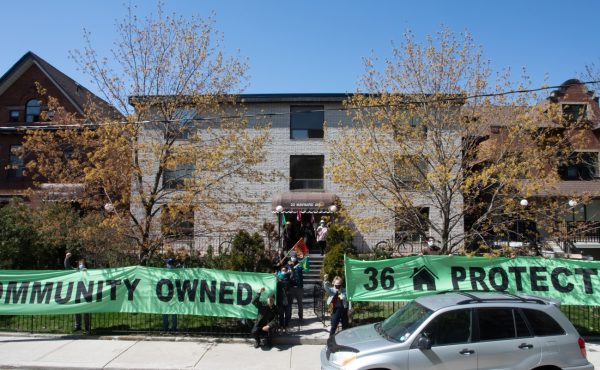
Mayor Rob Ford left the court by mid-day yesterday, but the ghosts of his two predecessors – Mel Lastman and David Miller – made their presence felt as the hearing shifted from cross examination to legal argument.
As I mentioned in yesterday’s column, the irony hanging over this proceeding is that Ford ended up getting bitten by accountability policies promoted by Miller. So it’s worth tracing this arc from the beginning of the rainbow:
In 2001, city council discovered it had agreed to a smelly computer leasing deal with a hidden escalator clause that saw the price almost double. As the political flames spread and pressure to cancel the lease mounted, Lastman hired one Alan Lenczner, Ford’s lawyer, to negotiate a settlement with MFP, the leasing company.
Lenczner and MFP’s lawyers hashed out a compromise, but several councillors, led by Miller — a lawyer who knew his way around a commercial contract — pressed hard for an investigation instead. Lenczner recommended against such a move, but council ignored him and established the Bellamy inquiry.
While no one went to jail, the inquiry’s findings destroyed, once and for all, the political career of Tom Jakobek (who secretly enabled the deal) as well as several Lastman era-bureaucrats. It led to far-reaching changes in the city’s procurement processes. Bellamy’s report also laid the foundation for the ethics and governance reforms enacted after Miller took office: the lobbyist registry, the ombud, the establishment of an independent auditor-general, the passage of the City of Toronto Act, (CoTA), and the creation of a council code of conduct, as specified by that piece of legislation.
So it was a bit strange, yesterday, to tune in to Lenczner’s highly legalistic arguments about all those Miller-era reforms and their application to the tribulations facing his client.
His case, in a nutshell, is that CoTA never gave council the authority to order one of its members to reimburse funds as a penalty for violating the code of conduct. CoTA, he told Justice Charles Hackland, is very precise: councillors who violate the code get “either” a reprimand or a fine of up to 90 days pay. Nothing more.
In other words, when, in August 2010, council (at Miller’s last meeting as mayor) ordered Ford to repay $3,150 in donations from lobbyists, as per the recommendations of integrity commissioner Janet Leiper, it was acting “ultra vires” – i.e., exceeding its authority. “The city had no power to do what it was doing,” he said. Ergo, everything that followed – Leiper’s repeated letters to Ford requesting he reimburse the funds, and then the report that came to council last February, when Ford spoke and voted – is rendered moot.
What’s more, Lenczner argued, everyone who is accused of something has a long-standing and well-established right to respond. So even if Leiper’s report was properly before council last February, Ford had an inalienable right to defend himself, by speaking to the motion.
The other key piece of Lenczner’s case is that council’s code of conduct and the municipal conflict of interest act should have nothing to do with one another. The code exists because of CoTA, while the MCIA is something else altogether. Therefore, it makes little sense, procedurally, for someone to be hauled up on an alleged code of conduct violation if the actual transgression involves a separate piece of legislation with its own procedures and penalties.
In a razor sharp contrast to his client’s foggy-headness, Lenczner’s arguments are deeply nuanced, technically complex and even persuasive – that is, until you pause to consider that Ford on Wednesday pre-emptively deflated his lawyer’s tires. He admitted, under oath, that he would have declared a conflict had someone told him to, thus making a mockery of Lenczner’s claim that Ford followed a consistent, albeit somewhat muddle-headed, principle for declaring conflicts.
And, as Clayton Ruby’s team pointed out, Ford had the right to challenge the legality of council’s August, 2010, decision to make him reimburse the funds. The code of conduct plainly specifies that members of council can apply for a judicial review. But Ford never availed himself. The question, is why not?
The seductive quality to Lenczner’s layered arguments is that they draw the viewer in closer and closer and closer until (as perhaps he intends) you lose sight of the big picture – like standing very close to a pointillist painting.
The big picture, of course, is the historical and legislative back-story to what’s transpired over the past two days. And we should all know it: a procurement scandal, borne of a hastily amalgamated city, created a tremendous public appetite for wide-ranging administrative and political reform. Having ridden that wave into office, Miller pushed for CoTA as the logical next step. He believed the City of Toronto needed to be treated as a mature, equal partner in our constitutional democracy – a government with real rights, not just a “creature” of the province.
With rights, as your parents loved to remind you, come responsibilities, and Council’s responsibilities were enshrined in the member’s code of conduct. It should not be read minutely, as Lenczner has done, but rather at the highest possible level: it is a foundational document laying out the principles that Toronto’s elected officials ought to embody. And, needless to add, David Miller meant for it to be read.




6 comments
I don’t get the benefit of separating CoTA and MCIA for Lenczner and Ford’s defence. Ford is on trial for breaking MCIA right? He allegedly spoke to and voted on a motion in which he had a pecuniary interest. That the pecuniary interest was created by CoTA doesn’t affect that and the fact he chose not to fight the decision based upon CoTA through proper legal channels doesn’t mitigate how or why he failed to comply with the MCIA. If someone does something to me that isn’t legal I don’t get to bypass the law in order to achieve a just outcome.
If anything trying to unmuddy those waters makes it all the more clear that this isn’t about a football charity at all. If he succeeds at separating Ford’s good deeds from the vote itself, he takes away his own best chip about the entire saga.
Now, if he argued that there was no pecuniary interest because Rob knew the order was illegal and was engaging in some political theatre to make his opponents look bad and of course he would declare a conflict if he’d ever thought the order to personally pay back 3k would hold up, that would be interesting.
Thank you for this very informative and appropriately historic look at this material. Context really is important.
The one thing that this trial has done is expose the “abilities” of the mayor to public scrutiny. Let us learn from this event.
I like David Miller. Good job on making those awesome rules.
What Jacob said.
(I don’t have the relevant documents at hand, so the following is a little speculative, unfortunately. Also, I am not a lawyer, obviously.)
I don’t know about reading the CoTA “broadly”. The Act lays out two penalties that Council can impose for violating the Code of Conduct: a reprimand and/or a suspension of pay. It’s not obvious to me that it implies that Council can impose penalties in general. If that’s not the case, then the question is whether making Ford pay back the $3150 is actually a penalty.
I recall that the Integrity Commissioner initially wanted the Foundation to pay back the donations, which would remove the violations and we could all acknowledge that it was an honest mistake. Ford said that it was impossible to do so since the money had been spent, and I believe that asking him to pay it back himself was a compromise. In effect, it would be as if Ford payed that money into his Foundation himself. There would be some complications in the paper trail, but we could all acknowledge that it was an honest mistake.
I believe that is why Ford was ordered to provide proof that he refunded the donors, not directly ordered to repay them. In doing so, there would be no effective Code of Conduct violation, so no penalty would need to be levied. If the reports and motions bear out what I have said, then I think Council’s actions were infra vires.
(Also, the MCIA always applies (it says so in section 15). It doesn’t magically not apply just because Ford was voting on a motion related to the Code of Conduct or the CoTA. That is a weird argument.)
Apart from the not reading the MCIA or the council handbook, I think the most serious matter Council needs to address with the Mayor is the distinction between the Staff as aid to the body corporate and his staff/advisers/counsel. From the testimony I’ve seen he seems to have been using City Staff to tell him what to do about matters that affect him alone. One wonders why the City Managers down the years did not remind Councillor Ford (as was) that he should avail himself of his own counsel as provided for in Council’s expense policy if in doubt about the legalities of his own actions.
The clearest explanation of the issues, and the background, I’ve read. The only thing left are the what-if’s of the judge’s decision. Will the judge consider, and is it his right or duty to consider, the effect of unseating an elected representative?